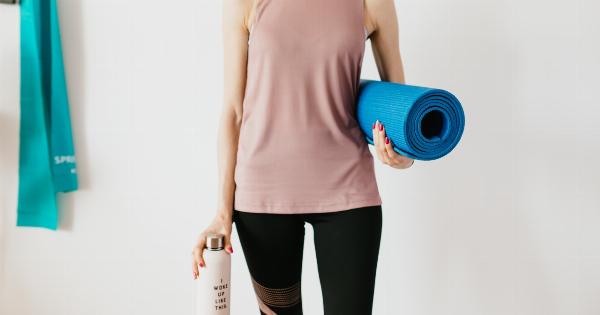Regular exercise has numerous benefits for physical and mental health. However, many people struggle to make fitness a regular part of their lives. They find it challenging to break through the exercise barrier and establish a consistent workout routine.
In this article, we will explore effective strategies to help you make fitness a habit and reap the rewards of an active lifestyle.
The Importance of Regular Exercise
Before delving into how to make fitness a habit, let us first understand why regular exercise is so crucial. Exercise is not just about achieving a certain body shape or losing weight. It plays a vital role in maintaining overall well-being.
Regular physical activity:.
- Boosts cardiovascular health and reduces the risk of heart disease
- Improves lung function and reduces the risk of respiratory problems
- Strengthens muscles and bones, preventing age-related conditions like osteoporosis
- Enhances mental health by reducing anxiety, stress, and symptoms of depression
- Increases energy levels and improves sleep quality
- Improves brain function and cognitive abilities
- Helps maintain a healthy weight and reduces the risk of obesity
- Reduces the risk of chronic diseases, such as type 2 diabetes and certain cancers
Breaking Through the Exercise Barrier
Now that we understand the importance of regular exercise, let’s explore effective strategies to break through the exercise barrier and make fitness an integral part of our lives:.
1. Set SMART Goals
Setting Specific, Measurable, Attainable, Relevant, and Time-bound (SMART) goals is essential when trying to establish a fitness habit. Determine what you want to achieve and set targets that are realistic and relevant to your current fitness level.
For example, instead of aiming to run a marathon immediately, start by setting a goal to run for 30 minutes three times a week.
2. Find an Activity You Enjoy
Exercise doesn’t have to be a chore; it can be enjoyable! Experiment with different activities such as running, cycling, swimming, dancing, or playing a sport. Choose exercises that you genuinely enjoy and look forward to.
When you find an activity you love, exercising becomes less of a task and more of a fun experience.
3. Schedule Time for Exercise
One of the biggest barriers to exercise is a lack of time. However, making time for exercise is a matter of setting priorities and managing your schedule effectively. Block out specific time slots in your calendar dedicated solely to physical activity.
Treat these slots as important appointments that you cannot miss, and soon enough, exercise will become an ingrained part of your routine.
4. Start Small and Gradually Increase Intensity
When starting an exercise routine, it’s crucial not to overwhelm yourself by diving headfirst into intense workouts. Begin with small, manageable workouts and gradually increase the intensity and duration over time.
This approach not only prevents burnout and injuries but also enables you to build stamina and strength gradually.
5. Accountability and Support
Accountability and support play a significant role in breaking the exercise barrier. Find a workout buddy or join a fitness group where you can exercise together and motivate each other.
Having someone to hold you accountable and share your fitness journey makes it easier to stay on track and maintain consistency.
6. Make Exercise a Non-Negotiable Priority
Commitment is key to making fitness a habit. Treat exercise as a non-negotiable part of your daily routine, just like brushing your teeth or eating meals.
By making exercise a non-negotiable priority, you eliminate the option to skip workouts and increase the likelihood of sticking to your fitness goals.
7. Celebrate Milestones and Progress
Recognize and celebrate your achievements along the way. Set milestones and reward yourself when you reach them. It could be treating yourself to a massage, buying new workout gear, or indulging in a guilt-free cheat meal.
Celebrating milestones boosts motivation and keeps you excited about your fitness journey.
8. Mix Up Your Routine
Doing the same exercises repeatedly can lead to boredom and a lack of motivation. Keep your workouts exciting by regularly mixing up your routine. Incorporate different exercises, try new workout classes, or explore outdoor activities.
Variety not only prevents monotony but also challenges your body in new ways, promoting overall fitness.
9. Track Your Progress
Tracking your progress is crucial to stay motivated and see how far you’ve come. Keep a fitness journal or use apps and wearable fitness trackers to monitor your workouts, track your performance, and record any improvements.
Seeing your progress visually provides a sense of accomplishment and encourages you to continue your fitness journey.
10. Practice Self-Compassion
Lastly, be kind to yourself throughout your fitness journey. It’s natural to miss a workout or have off-days. Instead of berating yourself or abandoning your efforts, practice self-compassion.
Recognize that setbacks are part of the process, and each day is an opportunity to start fresh. Embrace the journey, focus on the positive changes exercise brings, and persevere.
Conclusion
Breaking the exercise barrier and making fitness a habit may seem challenging at first, but with the right strategies, it is entirely achievable. Remember, it takes time and consistency to establish new habits.
Embrace the journey, be patient with yourself, and stay committed to a healthier and more active lifestyle. Soon enough, exercise will become an integral part of your routine, and you will reap the incredible benefits it offers.






























